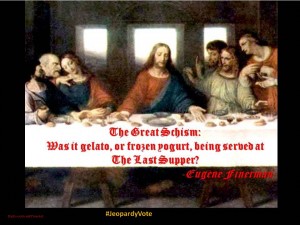Great Moments in Stupidity: July 19, 1870
Posted in General, On This Day on July 19th, 2009 by Eugene Finerman – 2 CommentsOn July 19, 1870 France declared war on Prussia, starting the Franco-Prussian War.
Louis Napoleon evidently had his own Neo-Conservatives who guaranteed that the French army would Can-Can its way to Berlin.
In fact, the Emperor decided to lead the chorus line himself. Unfortunately, the charming bumbler had delusions of competence; he inherited the name Bonaparte but none of his uncle’s military genius. His army of 120.000 soldiers never got further than Sedan, where the entire force was captured by the Germans. And this French army was supposed to be rescuing another French army that was trapped at Metz.
To Bismarck’s amazement, the French weren’t getting the hint. Having lost the Emperor, the French government now proclaimed itself a republic and vowed to continue the war. The French raised five more armies, which meant that the Germans had to take the trouble to crush four more of them. (The fifth army survived by fleeing to Switzerland.) Paris fortified itself and withstood a siege for three months; before the Parisians finally surrendered, they ate the animals in the city zoo.
Bismarck certainly was making the best of the situation. He had used the war to coalesce the German states into one unified–under Prussian hegemony–empire. The new Kaiser was vacationing at Versailles, while Bismarck was enjoying even more luxury as the uninvited guest at the Rothschild estate outside of Paris. Bismarck himself had turned down Versailles, quipping “Why live like a King when you can live like a God.”
The Chancellor was keeping a running tab of the expenses, and he had every intention of making France pay. Had France surrendered along with its hapless Emperor, Bismarck would have been satisfied with minor border adjustments. But after 10 months of war, Bismarck now demanded Alsace and Lorraine and a staggering indemnity of 6 billion gold Francs.
Although the unwelcomed guest of the French Rothschilds, Bismarck generally was more deferential to the family. Their man in Berlin, Gerson Bleichroder, was Bismarck’s banker and financial advisor. As you would gather from his name, Gerson was not exactly an Aryan aristocrat. Bleichroder played a role in the negotiations between a vanquished France and a vindictive Prussia. When informed of Germany’s demand for six billion gold Francs, the head of the French delegation protested, “If we started counting from the time of Jesus Christ, we would not reach such a sum.” Bismarck retorted–in French–“That’s why I have Bleichroder. He started counting long before Jesus Christ.”

